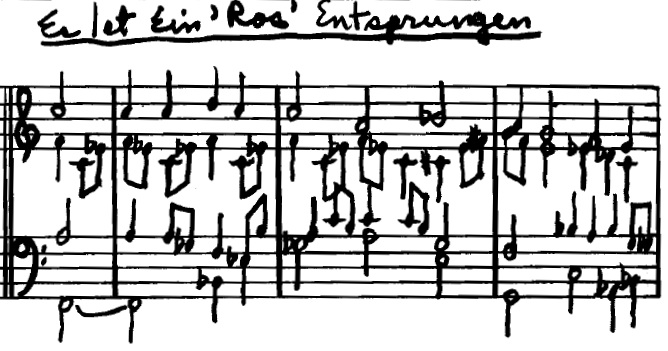![Violette-Andrew-05[Barbara-Nitke]](http://www.artsjournal.com/postclassic/wp/wp-content/uploads/2014/11/Violette-Andrew-05Barbara-Nitke-300x198.jpg) Composer Andrew Violette came to Bard to give a composer’s forum last week. I’d followed his music via CDs for years and we’d corresponded, but I’d never met him. He’s known for some really long, intense pieces, such as his three-hour-long Seventh Piano Sonata, which I wrote about years ago. He looks less tough in person than he does in his photos, and he spent several years as a Benedictine monk. He wanted to play something live, and since he hadn’t written anything for piano since that 2001 sonata, he chose to play half of a book of chorale harmonizations he’d written decades ago, 1982-3. And they were quite amazing, partly because he played them with such grace and energy. He puts his recordings on YouTube, and you can hear his Harmonizations here, here, here, here, and here. He harmonized hymns for the entire liturgical year using atonal modes – Messiaen’s “modes of limited transposition,” and all subsets of the octatonic, made up of triads with roots a tritone apart. I knew almost all of the hymns and chorale melodies, and it was kind of wonderful hearing the familiar tunes relegated to such exotic contexts. I had an advantage in this respect over my students, who seemed to enjoy the Christmas tunes most because they recognized those.
Composer Andrew Violette came to Bard to give a composer’s forum last week. I’d followed his music via CDs for years and we’d corresponded, but I’d never met him. He’s known for some really long, intense pieces, such as his three-hour-long Seventh Piano Sonata, which I wrote about years ago. He looks less tough in person than he does in his photos, and he spent several years as a Benedictine monk. He wanted to play something live, and since he hadn’t written anything for piano since that 2001 sonata, he chose to play half of a book of chorale harmonizations he’d written decades ago, 1982-3. And they were quite amazing, partly because he played them with such grace and energy. He puts his recordings on YouTube, and you can hear his Harmonizations here, here, here, here, and here. He harmonized hymns for the entire liturgical year using atonal modes – Messiaen’s “modes of limited transposition,” and all subsets of the octatonic, made up of triads with roots a tritone apart. I knew almost all of the hymns and chorale melodies, and it was kind of wonderful hearing the familiar tunes relegated to such exotic contexts. I had an advantage in this respect over my students, who seemed to enjoy the Christmas tunes most because they recognized those.
Andrew then played an excerpt from his two-hour, six-voice, a capella Mass, an absolutely stunning work of Gesualdo-like chromaticism, continuously vibrant throughout its marathon length. Astonishing that he got six singers to sing so difficult and demanding a work so beautifully. He puts all his scores up for free at ismlp.org, too, so I’ve been on a downloading frenzy since he left. He’s a total original, what some would call an eccentric, a dropout from the new-music world (trained at Juilliard, refuses to teach), and someone who, as he puts it, is driven to write long works from the need to create an entire world with each piece. [UPDATE:] In addition, talking afterward Andrew and I discovered that we share some enthusiasms for insufficiently recognized composers in common, including M.C. Maguire and Monroe Golden – and also a conviction that there is no correlation between those composers who are most celebrated and those who make the best music.

